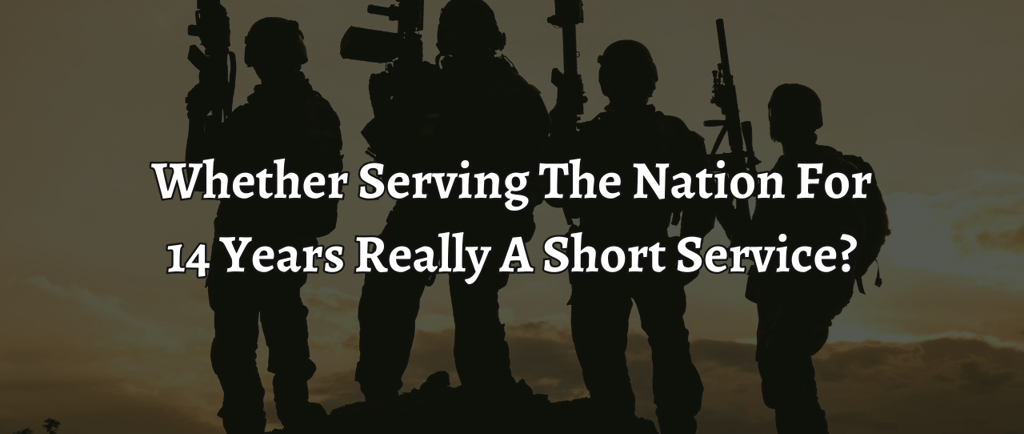WHETHER SERVING THE NATION FOR 14 YEARS REALLY A SHORT SERVICE?


Introduction
Serving in the Indian Armed Forces is an absolute honor and a noble career path for the youth. Many men and women choose to join the armed forces as officers, hoping to contribute to the nation's security and well-being. The Indian Armed Forces have two categories of commissioned officers: Permanent Commissioned Officers (PCOs) who intend to serve in the army for their entire career (minimum for 20 years) and Short-Service Commissioned Officers (SSCOs) who serve for a shorter duration (10 years plus 4 years if extended). While most people perceive 14 years of service as enough time to work a regular job and save towards retirement, the Indian Armed Forces see it as short service. This perception contradicts the reality that 14 years is a period long enough to be equivalent to a life sentence for a civilian if convicted. Despite the sacrifices made by SSC officers, they get no pension after retirement and are often overlooked or undervalued.
Challenges Faced By The SSCOs
Despite SSCOs' immense contributions to the Indian Armed Forces, they face numerous challenges during their service. These include but are not limited to, isolation and the risks associated with their work, which often places them in insecure regions. SSC officers' life is stressful and filled with constant change due to transfers from one base to another. They are away from family and friends for extended periods, with little time to engage in personal activities or hobbies. These officers are required to be mentally tough, emotionally resilient, physically fit, and ready to face any danger that may threaten the country which is the same as what permanent commissioned officers also have to face. There is not even a single difference in the amount of work or the type of work they do.
No Difference In Training
It is unfortunate that SSCOs, who undergo the same training as their Permanent Commissioned counterparts, do not receive a pension post-retirement while the Permanent Commissioned officers do. It is worth noting that the Indian Coast Guard and Armed Forces (Naval Officers) are trained together at the same academy, and undergo the same training regimen and standards, yet SSC officers do not receive pensions while the Coast Guards do receive pensions under the New Pension Scheme (NPS). This asymmetric treatment of SSCOs is a critical issue that requires immediate attention if we are to appreciate and reward SSCOs' valuable service.
Discrimination On The Basis Of the NPS
The government introduced the NPS, which also encompasses paramilitary forces. By extending the provisions of the NPS to include these forces, the government acknowledges their significant contribution to national security. However, it is important to note that SSC officers are voluntarily excluded from receiving pension benefits under the NPS.
Moreover, it is unfortunate that the Armed Forces—one of the most prominent branches of the Indian military—do not have a comparable remuneration package. SSC officers in the Armed Forces, who risk their lives for the nation, do not receive the same recognition as their counterparts in paramilitary forces. This disparity is not only unjust but also undermines the values of patriotism, loyalty, and sacrifice that the country upholds.
It is important to mention here that after the completion of 9 years of service, all officers in the armed forces get a 9 year ‘long’ service medal[2] even the ‘Short’ service commissioned officers. SSCOs may only serve for a brief period, but they work tirelessly and selflessly, facing challenges and dangers that are exclusive to this profession. SSC officers should not be overlooked and under-appreciated simply because their commitment to the army is time-limited or time-bound. The sacrifices made by SSC officers, coupled with the lack of support from the Indian Armed Forces or pension after retirement, puts the SSC officers in a bind of uncertainty. SSC officers deserve a pension to prepare for life after service as much as their Permanent Commission counterparts. SSC officers may have served less time in the Indian Armed Forces, but they are not different in terms of performing their duties or contributing to the nation's safety and security.
Physical Challenges Before SSCOs Post Retirement
Furthermore, the 14-year service in the Army takes a significant toll on SSC officers' bodies, making them prone to permanent injury and disability. The lack of disability pension only adds to the burden and unpredictability of life after serving in the Indian Armed Forces. The SSC officers are left with no prospects of receiving support in their post-retirement life if they suffer from injury or disability due to their service if the disability is aggravated to the military and the disability is below 20%.[3]
Conclusion
A significant change is necessary in the system to provide reasonable financial security to the SSC officers post-retirement. This situation is not a matter of sympathy, but the fact is that SSC officers are doing the same job as their peers and colleagues with permanent commission, and they deserve the same treatment. Furthermore, it should be noted that the act of serving in the Indian Army is voluntary and not everyone is cut out for it. Those that have the courage, willingness, and ability to serve should receive equal and fair treatment.
In conclusion, SSC officers in the Indian Armed Forces deserve equal recognition and remuneration for their service. They risk their lives and give up personal comforts to ensure that the country remains safe and secure. The fact that SSC officers do not receive financial benefits after retirement, such as a pension that other paramilitary forces do, is both disheartening and unfair. The Indian Armed Forces should consider levelling the playing field when it comes to benefits and recognition between the Permanent Commissioned and SSC officers. SSC officers' sacrifice, loyalty, and selfless service to the country should be acknowledged, and an adequate reward package should be in place, including disability pensions, as they manage the brunt of curbing issues in defence and security.
[2] Long service Awards – given at completion of 30 years, 20 years and 9 years – Ministry of Defence.
[3] Entitlement Rules for Casualty Pensionary Awards to The Armed Forces – Department of Ex-servicemen Welfare (DESW)


About the Author
Eshan Katiyar
Eshan is a 2nd year law student of Campus Law Centre, Faculty of Law, University of Delhi.
He is currently working with The Law Chambers of Maj Kavish Aggarwala on a permanent basis.